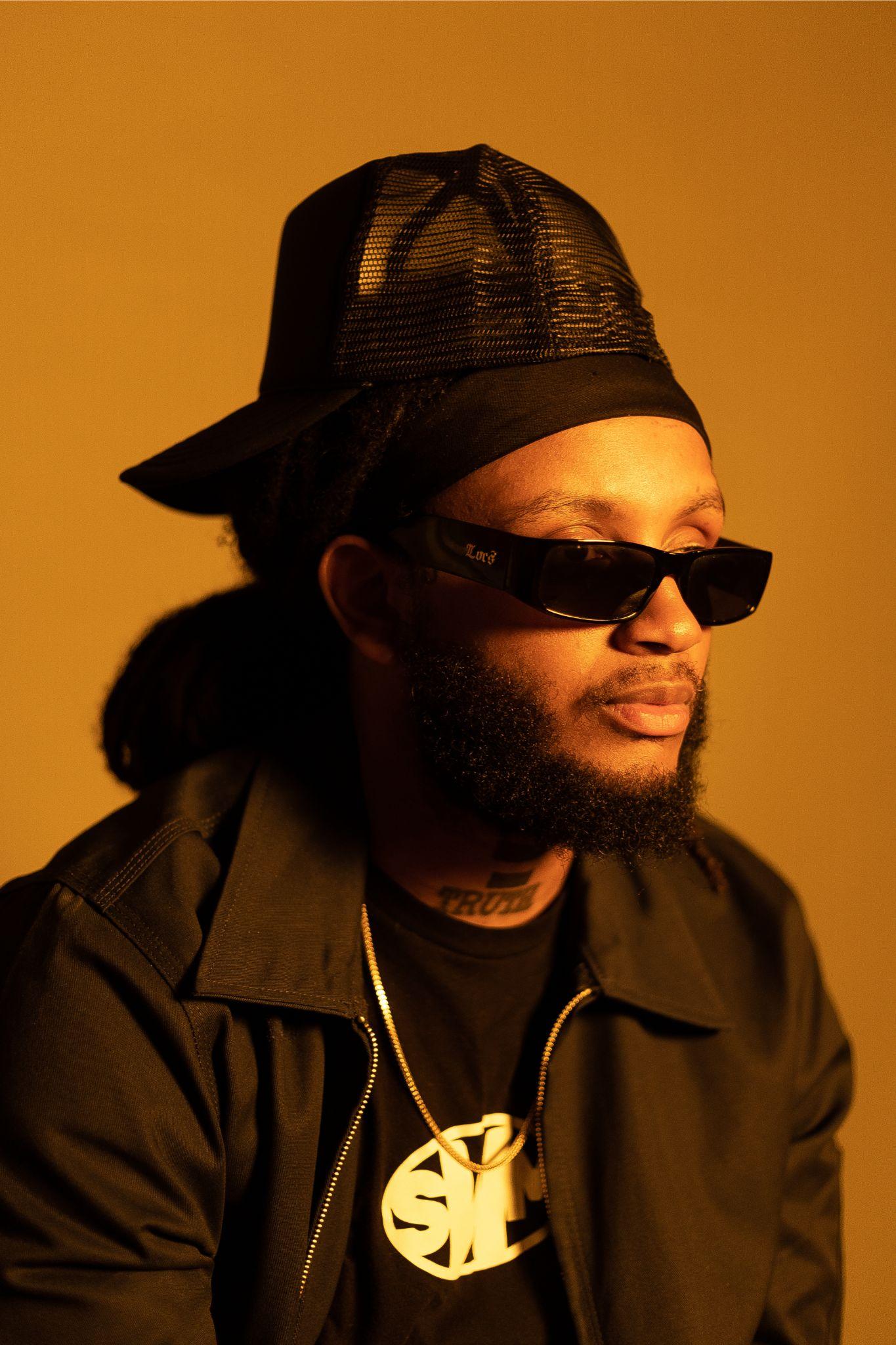
Justice Samari — From Sparkz to Self
Raised in Flatbush and rooted in lyricism, Justice Samari is carving his own path. One that honors his name, his purpose, and the power of words.
By Rilee LucasJuly 1 2025, Published 4:51 p.m. ET

For years, Justice Samari moved through the world as Sparkz Gawd, a name that echoed through hallways since junior high and carried him into the early chapters of his music career. As Justice Samari grew, first as a man, then as a father, the name he was born with began calling him back. “My mother gave me that name,” he says, “and now it’s my daughter’s name too. I feel like I had to put more respect on that.” The change wasn’t impulsive; it was a quiet shift he’d considered for some time. Sparkz still resonates, he admits, stating his closest friends still call him that, but what Justice Samari means to him and to the legacy he’s building resonates more.
“Looking in the mirror, it’s so much easier to know I spent all day rapping just being Justice Samari than ever trying to fit into what this name might mean to someone else,” Samari tells Bleu. “I want people new to me to call me by my name. My name is my name for a reason. I’m Justice Samari.”
Justice Samari grew up in the electric neighborhood of Flatbush, Brooklyn, where cyphers spill onto sidewalks and rap dreams are etched into corner store conversations. At just two years old, Samari was already in the studio with his older cousin, absorbing the energy of recording sessions before he could even form complete sentences. “A lot of kids out here in Brooklyn wanna rap,” he says. “The nicest rappers out here the world’s probably never heard of, he’s just somewhere on my block.”
While Flatbush raised him on rhythm, it was language that truly spoke to him. He didn’t grow up playing instruments, but his pen was sharp from an early age. Recognizing his gift for words, his mother enrolled him in a junior high school focused on creative writing. At home, his father introduced a different kind of discipline, having him read the dictionary, count money, and learn chess by the time he was six. “The dictionary taught me the weight of words.” Said Samari.
Justice Samari doesn’t just use words; he reveres them. A self-professed lover of language, he’s the kind of artist who reads the dictionary not just for meaning but for possibility. That attention to language is woven into his writing process. Sometimes, he’ll start with a single word in mind, something unexpected or precise, and build the verse around it. Samari holds deep admiration for lyricists like Mos Def, Andre 3000, and Lil Wayne—artists who, in his words, “say things you’d never expect to hear in a rap song and make it flow.”
Still, he recognizes the challenge: that being lyrical doesn’t always come with commercial visibility. “There’s a lot of super lyrical artists out there,” Samari says. “It’s tough to get that shine on the platforms we have. You’ve got to learn how to balance it and find a way to bring your flavor.” For Samari, that balance is sacred. He views lyricism as a means of painting life with language. “A lot of people don’t pick up books anymore,” he adds, “but they do turn on music hoping to feel something. That’s where the words matter.”
In 2010, a conversation with Capital Steez became the catalyst that shifted things from hobby to purpose. Justice was only 12, still figuring out who he was, but already drawn to the possibilities of rap. Justice knew Steez from around the neighborhood—he played ball while Steez rode bikes and skated. When Steez heard one of Samari’s early verses, he asked a question that stuck with him: Do you do storytelling? Samari didn’t know how to answer. He hadn’t lived enough yet to understand what stories he wanted to tell. Still, Steez recognized something in him.
“He told me, ‘Your voice will make or break if someone wants to work with you. Use your real voice and don’t be afraid to sit in what’s true to you”, Samari tells Bleu. That moment gave him something real: direction. “He pushed me like no other,” Samari continues. “I’ll forever appreciate him for that. He helped me take my career more seriously at the time, and because of that, I’m still here going at it.”
Since then, Samari’s career has grown tremendously. In 2024, he released his first full-length album as Justice Samari, titled What Would Justice Do. The title came to him when he freestyled the phrase over a beat. Samari immediately paused and thought, “Dang, that’s fly. I should call the album that.” Inspired by the familiar saying ‘What Would Jesus Do?’, the phrase prompted him to reflect on who he was becoming and the kind of example he wanted to set. The album became a mirror for that thought process, grounded in emotional honesty, tracing his own questions around growth, choices, and being a solid, present person.
Samari tells Bleu he wanted the project to feel human, “like something anyone could sit with and take something from.” Songs like “LUV OR LUST” lean into that duality, pairing a catchy hook with the emotional pull of being with a woman. “HYPNOTIQ” follows with a softer tone, expressing gratitude and admiration, and the skits woven between tracks help complete the story, showing how feelings evolve and how clarity is found in chaos. Samari’s process remains simple: feel it, write it, speak it.
One of the most surreal moments in Samari’s career thus far came when he had the opportunity to open for New York legends, The Lox. It wasn’t just another show; it was his favorite large crowd he’d ever performed for. He knew Lox fans were New Yorkers through and through, showing up for authenticity, so he took the stage with a clear sense of purpose.
What made the night even more meaningful to Samari was the chance to meet his favorite member of the group, Styles P. While Samari considers Jadakiss one of the greatest rappers of all time, it’s Styles P who connects with him on a deeper level. “I like evolution, I like character development,” he explains.
Later, Styles P and Samari crossed paths again at a family day BBQ in Yonkers. Being welcomed into the neighborhood, seeing where The Lox came from, and sharing space with the people they uplift was a full-circle moment for Samari. “Styles P is the people’s champ,” he says. “There are technically better rappers out there, but the people don’t love everybody like they love Styles.” The idea of building a similar legacy to Styles comes up, but Samari keeps it grounded: “I don’t know what my legacy’s gonna be. I just want mine to be based around what I’m able to do for people.”
While the shape of his legacy remains a question, Samari’s direction is certain: to deepen his art and extend his reach in ways that matter. Currently, Samari is working on his next project, Strictly 4 My Geniuses, which he describes simply as “deeper.” Not just in sound but in feeling and intention. For Samari, music isn’t just a collection of singles; It’s a story. Each song builds onto the last, forming a larger narrative that reflects his creative and mental state of being. As for what he wants people’s biggest takeaway to be, Samari tells Bleu, “I don’t know if I want their takeaway to be anything. Just take from it what you will.” Above all, he hopes it’s a positive exchange: “I just want people to feel good, I want them to reflect on it, and I want it to be a good energy exchange.”
Alongside his music, Samari is also focused on growing his independent label, Eternal Soundscapes. Going independent was a natural choice. “I’ve always been a terrible employee my whole life,” Samari admits. “It made more sense to stand ten toes on just knowing that I’m more of an independent.” His goal with the label is to help other artists find their independence without holding on to their rights or masters longer than necessary. “I just wanna help you figure it out, and when you figure it out, you gotta grow and be your own,” he says. Eternal Soundscapes isn’t just about records; it also hosts quarterly concerts and events like Locked In, which this summer will see its third edition.
Looking ahead five years, Samari envisions a life defined by growth: his family expanding, his daughter maturing, and himself evolving alongside them. “All I can see are the things that have to happen,” he reflects. “My family grows, my daughter grows, and I grow.” Growth isn’t just a goal; it’s the core of his journey.
When asked to sum up his music in three words, he didn’t hesitate: “Make it happen.” Those words capture more than just his creative process; they embody his mindset, his work ethic, and the promise he’s making to himself and his listeners. Justice Samari isn’t waiting for success to find him. He’s building it, step by step, with purpose and resilience, and in doing so, crafting a legacy that’s truly his own.

